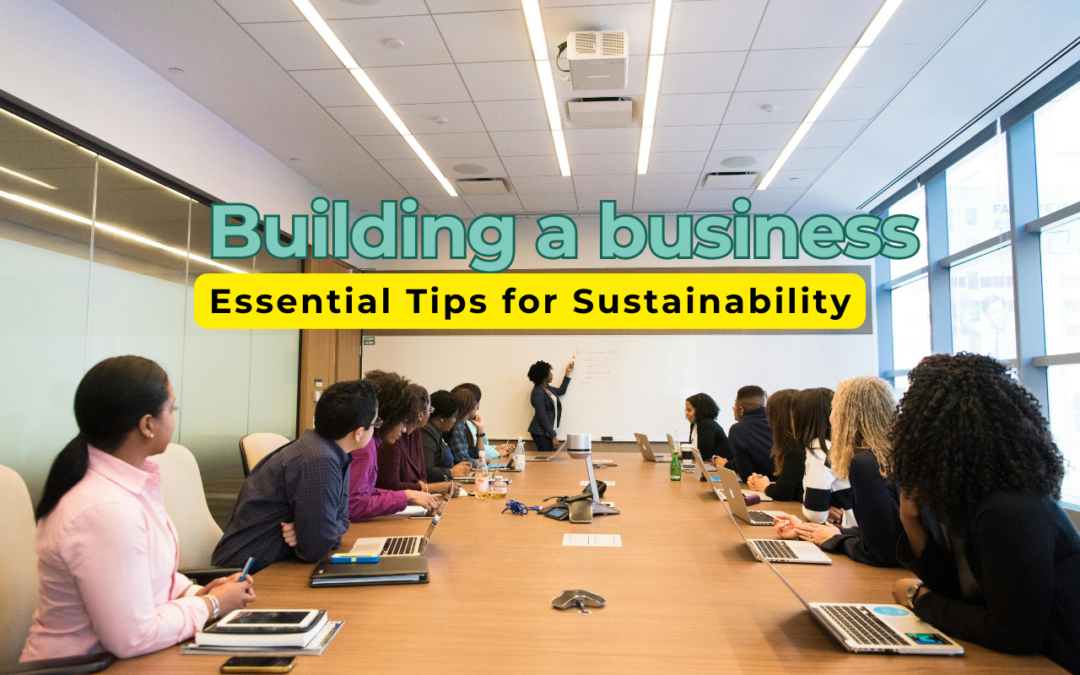Building a business that stands the test of time requires more than just a great idea and an initial boost of success. Sustainable businesses focus on long-term growth, adaptability, and a commitment to ethical and responsible practices. Here are essential tips to help you build a business that lasts.
1. Develop a Clear Vision and Mission
A sustainable business starts with a strong foundation—a well-defined vision and mission. Your vision should outline your long-term goals, while your mission should define how you will achieve them. These elements will guide your decision-making and help attract like-minded employees, partners, and customers.
Steps to Create a Strong Vision and Mission:
- Identify your core values and principles.
- Define what success looks like for your business in 5, 10, or 20 years.
- Ensure your vision aligns with market needs and trends.
- Communicate your mission and vision clearly to your team and stakeholders.
2. Prioritize Financial Sustainability
Many businesses fail due to poor financial management. To ensure longevity:
- Maintain a solid financial plan with realistic revenue projections.
- Keep expenses in check and reinvest wisely.
- Diversify income streams to reduce risk.
- Build an emergency fund for economic downturns.
- Regularly conduct financial audits and adjust your strategy accordingly.
Additional Financial Strategies:
- Implement a pricing strategy that balances affordability and profitability.
- Secure funding from diverse sources such as grants, investors, and crowdfunding.
- Utilize financial forecasting tools to predict future trends and potential risks.
- Reduce unnecessary operational costs and optimize resources.
3. Embrace Innovation and Adaptability
The market is constantly evolving, and businesses that survive are those that adapt. Stay ahead by:
- Investing in research and development.
- Keeping up with industry trends and technological advancements.
- Listening to customer feedback and making necessary changes.
- Encouraging a culture of innovation within your team.
Ways to Foster Innovation:
- Create an internal think-tank to generate new ideas.
- Offer incentives for employees who contribute innovative solutions.
- Partner with startups and research institutions to explore cutting-edge developments.
- Implement lean startup methodologies to test new ideas quickly and efficiently.
4. Commit to Ethical and Sustainable Practices
Sustainability isn’t just about profits; it’s about responsible business practices. Companies that prioritize environmental and social responsibility often build stronger brand loyalty. Consider:
- Using eco-friendly materials and reducing waste.
- Supporting fair labor practices and ethical sourcing.
- Engaging in corporate social responsibility (CSR) initiatives.
Examples of Sustainable Business Practices:
- Implementing a circular economy model where waste is minimized and resources are reused.
- Investing in carbon offset programs to balance your environmental impact.
- Partnering with NGOs and community organizations to drive social change.
- Transitioning to renewable energy sources to power your operations.
5. Build Strong Customer Relationships
Customer retention is key to a lasting business. To foster loyalty:
- Offer exceptional customer service.
- Personalize customer interactions.
- Use customer feedback to improve your products or services.
- Build a community around your brand through social media and engagement strategies.
Customer Engagement Strategies:
- Implement a loyalty rewards program to encourage repeat business.
- Utilize AI-driven chatbots to provide instant customer support.
- Host customer appreciation events to strengthen relationships.
- Develop high-quality content marketing to educate and engage customers.
6. Invest in Employee Growth and Well-Being
A sustainable business values its employees. Happy and engaged employees contribute to a company’s long-term success. Ensure sustainability by:
- Providing fair compensation and benefits.
- Encouraging professional development and training.
- Creating a positive work environment with open communication.
- Prioritizing employee well-being and work-life balance.
Employee Retention Strategies:
- Offer mentorship and career growth opportunities.
- Implement flexible work arrangements to enhance work-life balance.
- Recognize and reward employee contributions through bonuses and promotions.
- Foster an inclusive and diverse workplace culture.
7. Leverage Technology and Digital Transformation
The digital age has revolutionized the way businesses operate. To remain competitive:
- Implement automation and digital tools to improve efficiency.
- Utilize data analytics to make informed decisions.
- Invest in cybersecurity to protect sensitive information.
- Establish a strong online presence through social media and digital marketing.
Digital Transformation Strategies:
- Adopt cloud-based solutions for enhanced scalability and security.
- Use AI and machine learning to optimize business processes.
- Develop a user-friendly website and mobile app for customer convenience.
- Integrate e-commerce solutions to expand your market reach.
8. Develop Strong Partnerships and Networks
Collaboration is a powerful tool for business longevity. Forge meaningful relationships with:
- Industry peers and associations.
- Investors and business mentors.
- Suppliers and service providers who share your values.
- Strategic partners to expand your reach and capabilities.
Benefits of Strategic Partnerships:
- Access to new markets and customer bases.
- Shared resources and reduced operational costs.
- Strengthened credibility and industry reputation.
- Opportunities for joint ventures and innovation.
9. Focus on Scalability
A business that lasts is one that can grow without losing efficiency. Plan for scalability by:
- Standardizing processes and workflows.
- Investing in infrastructure and systems that support growth.
- Ensuring your business model is flexible and adaptable to expansion.
- Identifying new revenue streams and market segments.
Scaling Strategies:
- Implement franchise or licensing models to expand without significant overhead.
- Outsource non-core functions to maintain efficiency.
- Use analytics to determine the most viable expansion opportunities.
- Create partnerships with distributors to reach new regions.
10. Monitor Performance and Continuously Improve
Regularly evaluating your building a business performance helps you identify strengths and areas for improvement. Set key performance indicators (KPIs) and track metrics such as:
- Financial health and profitability.
- Customer satisfaction and retention rates.
- Employee engagement and productivity.
- Environmental and social impact.
Continuous Improvement Techniques:
- Use feedback loops to refine products and services.
- Adopt Kaizen principles for incremental improvements.
- Conduct regular SWOT analyses to assess business positioning.
- Invest in employee training and skill development.
Final Thoughts
Building a business that lasts requires dedication, adaptability, and a commitment to sustainability. By focusing on long-term planning, ethical business practices, strong customer and employee relationships, and continuous improvement, you can create a business that not only survives but thrives for years to come.
What strategies have you implemented to ensure the sustainability of your building a business? Share your thoughts in the comments!












